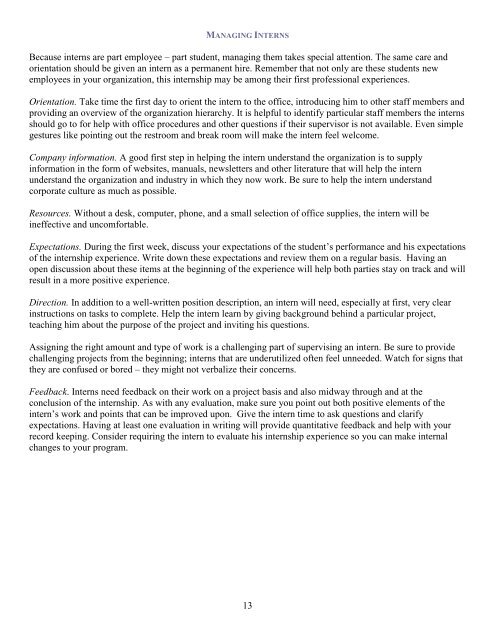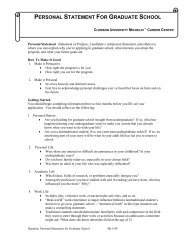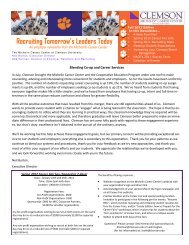Internship Handbook - Michelin Career Center - Clemson University
Internship Handbook - Michelin Career Center - Clemson University
Internship Handbook - Michelin Career Center - Clemson University
Create successful ePaper yourself
Turn your PDF publications into a flip-book with our unique Google optimized e-Paper software.
MANAGING INTERNS<br />
Because interns are part employee – part student, managing them takes special attention. The same care and<br />
orientation should be given an intern as a permanent hire. Remember that not only are these students new<br />
employees in your organization, this internship may be among their first professional experiences.<br />
Orientation. Take time the first day to orient the intern to the office, introducing him to other staff members and<br />
providing an overview of the organization hierarchy. It is helpful to identify particular staff members the interns<br />
should go to for help with office procedures and other questions if their supervisor is not available. Even simple<br />
gestures like pointing out the restroom and break room will make the intern feel welcome.<br />
Company information. A good first step in helping the intern understand the organization is to supply<br />
information in the form of websites, manuals, newsletters and other literature that will help the intern<br />
understand the organization and industry in which they now work. Be sure to help the intern understand<br />
corporate culture as much as possible.<br />
Resources. Without a desk, computer, phone, and a small selection of office supplies, the intern will be<br />
ineffective and uncomfortable.<br />
Expectations. During the first week, discuss your expectations of the student’s performance and his expectations<br />
of the internship experience. Write down these expectations and review them on a regular basis. Having an<br />
open discussion about these items at the beginning of the experience will help both parties stay on track and will<br />
result in a more positive experience.<br />
Direction. In addition to a well-written position description, an intern will need, especially at first, very clear<br />
instructions on tasks to complete. Help the intern learn by giving background behind a particular project,<br />
teaching him about the purpose of the project and inviting his questions.<br />
Assigning the right amount and type of work is a challenging part of supervising an intern. Be sure to provide<br />
challenging projects from the beginning; interns that are underutilized often feel unneeded. Watch for signs that<br />
they are confused or bored – they might not verbalize their concerns.<br />
Feedback. Interns need feedback on their work on a project basis and also midway through and at the<br />
conclusion of the internship. As with any evaluation, make sure you point out both positive elements of the<br />
intern’s work and points that can be improved upon. Give the intern time to ask questions and clarify<br />
expectations. Having at least one evaluation in writing will provide quantitative feedback and help with your<br />
record keeping. Consider requiring the intern to evaluate his internship experience so you can make internal<br />
changes to your program.<br />
13








